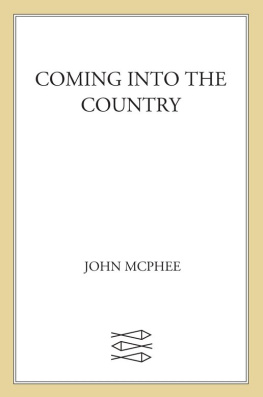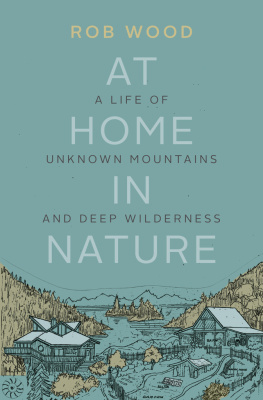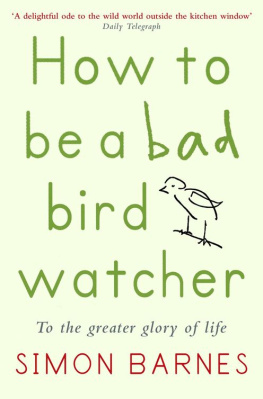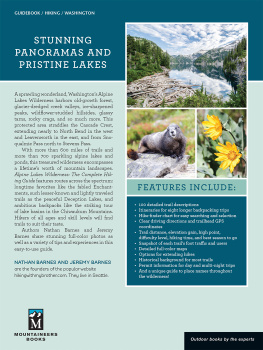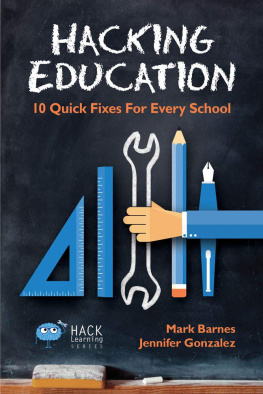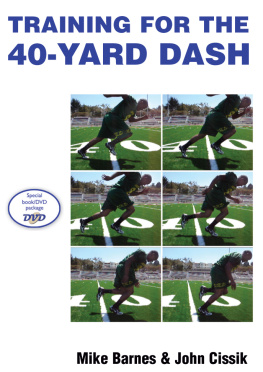Kim Barnes - In the Wilderness: Coming of Age in Unknown Country
Here you can read online Kim Barnes - In the Wilderness: Coming of Age in Unknown Country full text of the book (entire story) in english for free. Download pdf and epub, get meaning, cover and reviews about this ebook. year: 1997, publisher: Anchor Books, genre: Non-fiction. Description of the work, (preface) as well as reviews are available. Best literature library LitArk.com created for fans of good reading and offers a wide selection of genres:
Romance novel
Science fiction
Adventure
Detective
Science
History
Home and family
Prose
Art
Politics
Computer
Non-fiction
Religion
Business
Children
Humor
Choose a favorite category and find really read worthwhile books. Enjoy immersion in the world of imagination, feel the emotions of the characters or learn something new for yourself, make an fascinating discovery.

- Book:In the Wilderness: Coming of Age in Unknown Country
- Author:
- Publisher:Anchor Books
- Genre:
- Year:1997
- Rating:4 / 5
- Favourites:Add to favourites
- Your mark:
- 80
- 1
- 2
- 3
- 4
- 5
In the Wilderness: Coming of Age in Unknown Country: summary, description and annotation
We offer to read an annotation, description, summary or preface (depends on what the author of the book "In the Wilderness: Coming of Age in Unknown Country" wrote himself). If you haven't found the necessary information about the book — write in the comments, we will try to find it.
Kim Barnes: author's other books
Who wrote In the Wilderness: Coming of Age in Unknown Country? Find out the surname, the name of the author of the book and a list of all author's works by series.
In the Wilderness: Coming of Age in Unknown Country — read online for free the complete book (whole text) full work
Below is the text of the book, divided by pages. System saving the place of the last page read, allows you to conveniently read the book "In the Wilderness: Coming of Age in Unknown Country" online for free, without having to search again every time where you left off. Put a bookmark, and you can go to the page where you finished reading at any time.
Font size:
Interval:
Bookmark:
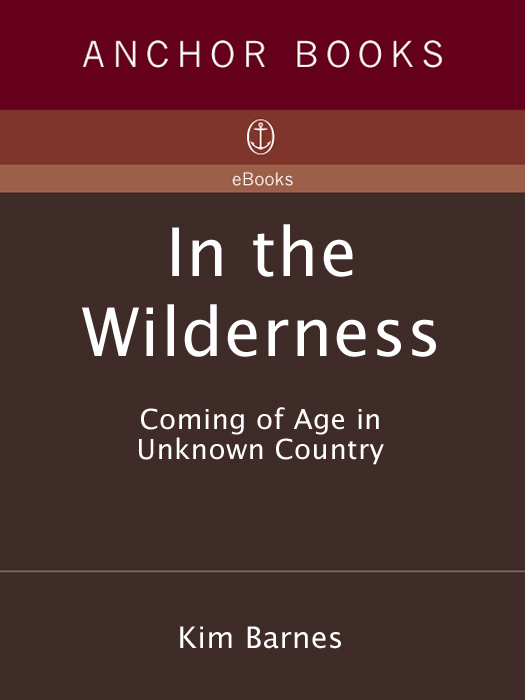
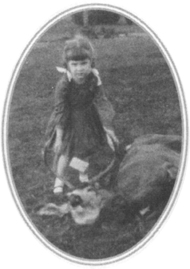
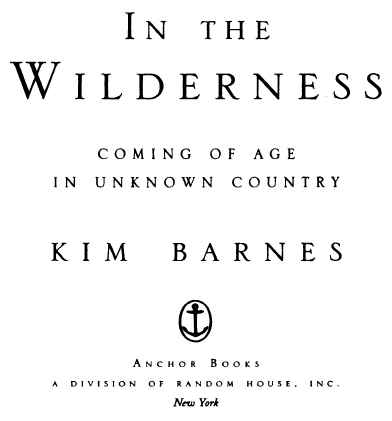
In consideration of their privacy, the names of some of the people appearing in this text have been changed.
An earlier version of Chapter Four was originally published in The Georgia Review.
There are many people without whose support I would never have found my way back: Mary Clearman Blew, who shared with me her vision; Claire Davis and Dennis Held, who offered friendship no matter the season; and Robert Johnson, upon whose quiet belief and confidence I could always depend. Thanks to Robert Wrigley for seeing me through; it is my hope that our childrenPhilip, Jordan and Jacewill add to this story their own. I would also like to thank Keith and Shirley Browning, Margaret Bremer, Ripley Schemm, Annick Smith, Bill Kittredge, Judy Blunt, Julia Watson, Dee McNamer, Rene Wayne Golden, Bruce Tracy, and all the others who offered their encouragement and direction. Thanks, too, to the Idaho Commission on the Arts and the PEN/Jerard Fund.
I am also grateful to those who have dedicated their time to uncovering and retelling much of the local history, which might otherwise have been lost. Among many upon whose knowledge and research I depended were Lalia Boone, Cort Conley, Ladd Hamilton, Louise Shadduck, Ralph Space, Sandra Taylor, and Johnny Johnson.
In attempting to acknowledge the inevitable disparities between my recollection and that of those who might tell this story otherwise, I recall a line attributed to Barbara Kingsolver: Memory is a complicated thing, a relative to truth, but not its twin.
For my husband, Robert Wrigley,
my saving grace
In memory of Nan,
whose wisdom and courage
continue to sustain me
And for my parents
Willows never forget how it feels
to be young.
Do you remember where you came from?
Gravel remembers.
Even the upper end of the river
believes in the ocean.
Exactly at midnight
yesterday sighs away.
What I believe is,
all animals have one soul.
Over the land they love
they crisscross forever.
W ILLIAM S TAFFORD
C LIMBING A LONG THE R IVER
Until the spirit be poured
upon us from on high, and the wilderness
be a fruitful field, and the fruitful field
be counted for a forest. Then
judgment shall dwell in the wilderness.
I SAIAH 32:15,16
Past the Clearwater Timber Protection Association and the Fire Danger board, across the creek and before the dump, the small house squatted in a pocket of red fir and pine, not visible from the road. The locals called the hollow Dogpatch. The Joneses lived nearby, and Gerty Buck and her son, who owned a motorcycle, and someone else across the way who had two German shepherds chained to a clothesline. The dogs were the first things my younger brother, Greg, and I saw when we stepped off the bus after school. They barked ferociously, racing back and forth between the two T-shaped poles, until we disappeared down the steep path leading past the woodshed and root cellar to a small piece of flat ground surrounded by trees.
Beside our house, painted the same umber red as other shacks built by local loggers on company land, flowed the spring, and from its constant source we took our water. Each day the train, pulling its load of logs, ran the route from Headquarters to the mill at Lewiston and back, and my brother and I, feeling the tremor of its coming before we heard the engines rumble, ran to the rear of the house and through the trees to wave at the brakeman and engineer. When not in school, we filled our days exploring the near woods, digging after ground squirrels, amassing piles of found treasure: feathers blue as river water, bones of deer, old buckets and chains, nests stitched through with colorful bits of moss.
A narrow footbridge crossed the spring to the path leading to the outhouse. Several years before his death, one of my great-uncles, Ed Swanson, had added a small bathroom off the kitchen, but the pipes froze in winter and clogged in summer. The outdoor privy seemed familiar, made comfortable by a tightly closing door and a genuine toilet seat. Behind the outhouse the trees grew dense, and the little building seemed the last safe place before the forest closed in. It was a corner boundary for my brother and mehome base for hide-and-seek, our secret meeting place where we could be hidden from our mothers eyes.
On the other side of the spring, the root cellar squatted deep in the bank beneath its cowl of sod. It had begun its service as a bomb shelter, dug out in one day by Uncle Ed during the Cuban missile crisis. I cannot imagine why the shy Swede believed Castro might target him and his family deep in the wilds of Idaho, but his panic and furious excavating became the stuff of family legend. He leveled the dirt floor, built the walls and roof of rough-cut cedar and hung a door so heavy the hinges shrieked when it opened. He filled the shelter with tins of food and brown Purex bottles of water. Finally, he cut a hole in one wall and added a large crank air vent. It reminded me of the meat grinder my mother used to make sausage, and when my brother and I together turned the handle the wind sang in fresh and cold.
By the time we came to live in the hollow, the shelter had become a catchall for old clothes and empty boxes. We hauled case after case of pop bottles over the hill to Headquarters, pulling our wagon along the one-mile stretch of road, stopping each time a logging truck geared for the rise. When we gave a high, imaginary tug, the driver let loose a brawling blast from his air horn and wed howl with pleasure. In Headquarters, the store saved its outdated comic books, covers torn away, in a pile behind the fishing gear. With the dimes from our turned-in bottles we could each head home with two comics and a chocolate cone, our wagon rattling empty behind us.
Across the track was the dump with its brown corked bottles, the bits of metal and porcelain we carried home like booty. The deer bed was there, fragrant grass crushed beneath an overhanging branch of yellow pine. We would lie down and smell the musk, pick tufts of hair from the needles, imagine the warmth of a fawn nestled tight in the curve of its mothers flank. We hunted the grouse that roosted near the house. Sometimes my brother and I would find them huddled in the woodshed. Fool hens! wed shout, pumping our pellet guns, shooting them near the shed, where their wings beat against the metal siding.
We fished no matter the season, first testing our luck in the shallow spring, then in Reeds Creek, cutting through the meadow a half mile south. We knew each shadowed pool and the fish that stilled themselves there: many times we jerked them free of the water, only to see them sail from our hooks like silvery kites. Always, we knew, they would return to their favorite bend, where grasses hung down and fat grasshoppers fell.
The meadow spread out from the creek on either side, a marsh, really, spongy and thick with cattails. Deer fed at its edges and once, just as the big rainbow I had caught and lost five times before gave in to my patience and took the worm I let drift one last time by its hole, from the corner of my eye I saw the ground shift and settle. In a nesting of dry fern lay a fawn, curled against itself and nearly invisible. The rod jumped in my hands but I could not look from that spot. I was afraid the shape might disappear, my sight might deceive me, though the fawn huddled so close I might cast my line across its dappled back. As still as it was I could see the body tremble, the nostrils flare with the scent of me.
Font size:
Interval:
Bookmark:
Similar books «In the Wilderness: Coming of Age in Unknown Country»
Look at similar books to In the Wilderness: Coming of Age in Unknown Country. We have selected literature similar in name and meaning in the hope of providing readers with more options to find new, interesting, not yet read works.
Discussion, reviews of the book In the Wilderness: Coming of Age in Unknown Country and just readers' own opinions. Leave your comments, write what you think about the work, its meaning or the main characters. Specify what exactly you liked and what you didn't like, and why you think so.



